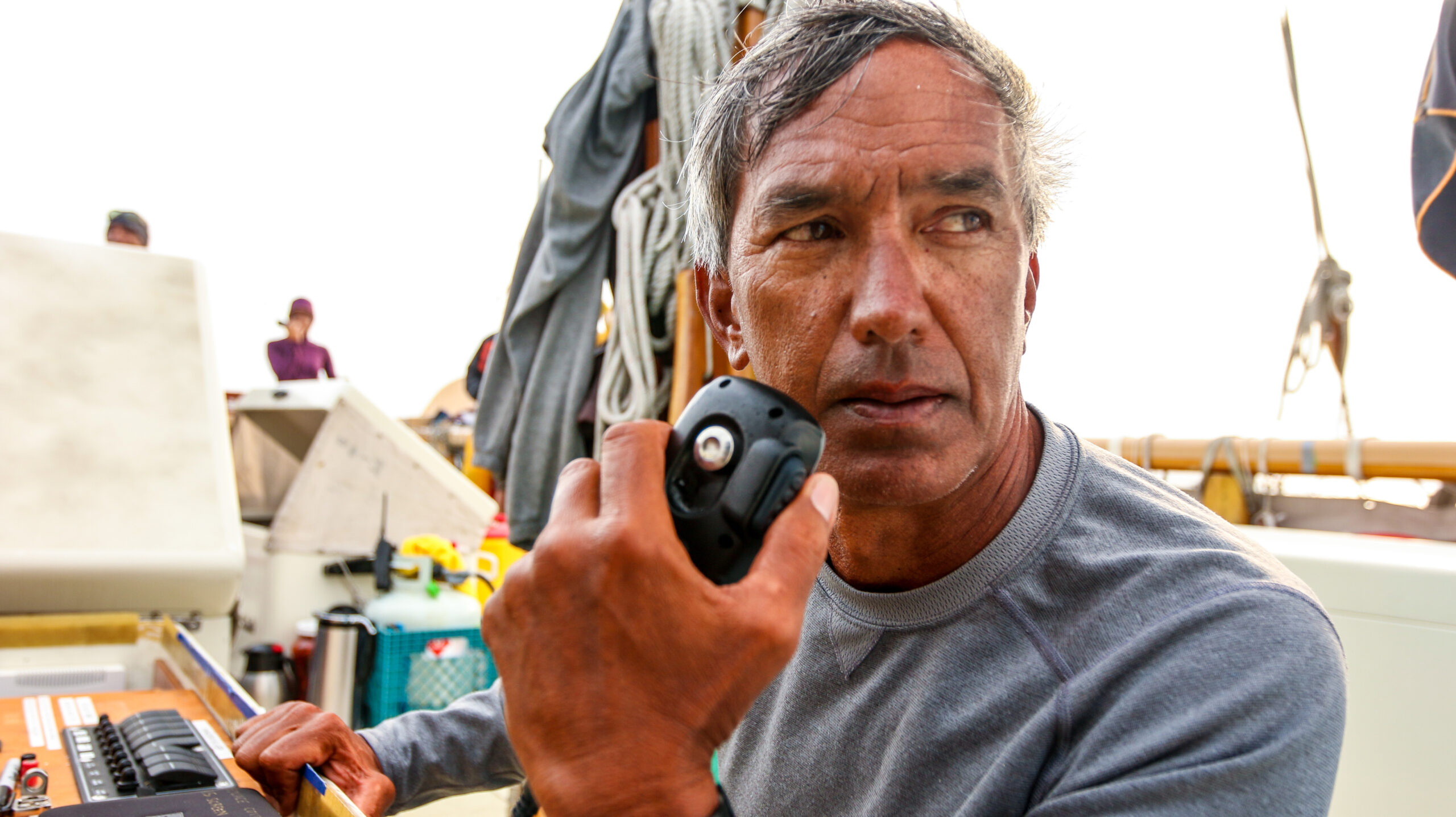
LMU’s Ethnic and Intercultural Services will host the legendary Hawaiian canoe known as the Hōkūleʻa, and its crew on Thursday, Oct. 26, from 7-9 p.m., in the Featherston Life Sciences Auditorium to share its four-year circumnavigation of the Pacific Ocean called Moananuiākea Voyage: A Voyage for Earth. Register here.
Nainoa Thompson, master navigator and CEO of the Polynesian Voyaging Society, and crew will share how this inspiring voyage has revived the lost art of Polynesian voyaging and navigation and learn the environmental and cultural mission of this voyage where they are inspiring people to care for the Earth and its oceans. In the early ’70s, Thompson was brought into the effort to build Hōkūleʻa and introduced to the dream of using stars to navigate her. He studied under Master Navigator Mau Piailug and Bishop museum planetarium lecturer Will Kyselka. In 1980, Thompson became the first Native Hawaiian in 600 years to navigate a voyaging canoe to Tahiti without instruments. Since then, he has captained and navigated Hōkūleʻa on more than a dozen voyages and has passed on his knowledge for decades.
As part of their journey, the Hōkūleʻa and its crew will make several stops in southern California, including Ventura, Marina del Rey, Newport, Dana Point, and San Diego. This traditional double-hulled canoe began its journey down the Pacific Coast in June 2023 in southeast Alaska to ignite 10 million “planetary navigators” by developing young leaders and engaging communities around the globe to help navigate the Earth towards a healthy, thriving future. The team will share their journey to deepen people’s understanding of the oceans and indigenous knowledge. This voyage will cover about 43,000 nautical miles, 36 countries, archipelagoes, nearly 100 indigenous territories, and more than 300 ports. In this tradition, the crew hopes to:
- Preserve their voyaging heritage to ensure it is never lost again;
- Activate millions of “planetary navigators” who will pursue critical and inspiring “voyages” to ensure a better future for the Earth;
- Bring millions of learners of all ages with us through our third canoe to create change and move us toward a healthier ocean and planet;
- Explore and share the magnificence of the world’s largest ocean, which breathes life into all of Earth’s systems and amplifies the movement to care for it because life on Earth will not be healthy without a healthy ocean.
LMU alum Alo Coleman ’19, a former ASLMU president, Intercultural Facilitator, and member of Nā Kōlea, is working with Ethnic and Intercultural Services to help bring this voyage to LMU. “I grew up hearing stories about the Hokule’a canoe and how, despite tremendous odds, it revived a nearly completely lost history and practice for the Polynesian peoples – traditional celestial navigation,” said Coleman. “The fact that the canoe travels hundreds of miles with no modern instruments and only navigates by the stars blows my mind. These stories were passed down in my family stemming from my grandfather Gov. Peter Tali Coleman’s support of the Hokule’a’s first voyage from Hawaii to Tahiti in the mid-1970s.”
During Coleman’s time as LMU’s first Pacific Islander ASLMU president, he hoped the canoe would dock in nearby Marina del Rey so he could share this aspect of Pacific Islander culture with the LMU community. “Now, in 2023, as an alum, the LMU community is getting the opportunity to experience its arrival to California’s coast for the first time in nearly 30 years and hear stories from their crew,” said Coleman. “This event will help to educate the mind, body, and spirit of students by revealing how all three of these aspects of ourselves must be interconnected while we talk about marine conservation, sustainability and climate change, and cultural revitalization. LMU is less than four miles from the ocean, and many students, including myself, during my time at LMU create lasting memories at those beaches. We owe it to those beaches and the ocean to care for them. And in doing so, we will improve the lives of those who depend on the ocean for their livelihoods.”
Olivia Rodriguez ’15, Intercultural Facilitator Program Coordinator in EIS, worked with Coleman to connect the event with the campus. “I’d never heard of this organization before, but when I was talking to Alo about it, he spoke about them and their mission with such a beautiful passion that I couldn’t help but fall in love with them as well,” said Rodriguez. “The Moananuiākea Voyage reminds us that social justice and cultural preservation exist outside ourselves. It is an effort that requires everyone to engage in, even if we won’t see the fruits of our labor.”
How Thompson has brought this crucial Polynesian tradition back to life is inspiring and is one of the ways, as a community, we can connect back to protecting the Earth and its oceans. “What a beautiful way to honor your culture that had already suffered and regressed under colonization,” said Rodriguez. “Regardless of whether you identify with the Polynesian community, they are still our brothers and sisters, and they are using their traditions to connect with Mother Earth and protect her in ways she desperately needs to be protected. This is education that benefits all of us. I love that this voyage intersects with environmental justice and cultural preservation.”
The Hōkūleʻ will be docked in Marina del Rey at the Chace Park dock and will be offering dockside canoe tours to the public. Head aboard the legendary Hōkūleʻa and meet the crew circumnavigating the Pacific on the Moananuiākea Voyage:
- Thursday, Oct. 26, 1-4 p.m.
- Friday, Oct. 27, 1-4 p.m.
- Saturday, Oct. 28, 9:30-11:30 a.m. and 1-5 p.m.
Visit hokulea.com and @hokuleacrew on social media for the latest updates on events and the Moananuiākea Voyage. For more information on the Moananuiākea Voyage: A Voyage for Earth event, view the details on LEO here. LMU community members should register to claim seats as Thompson typically draws large crowds, and seats will go fast.



